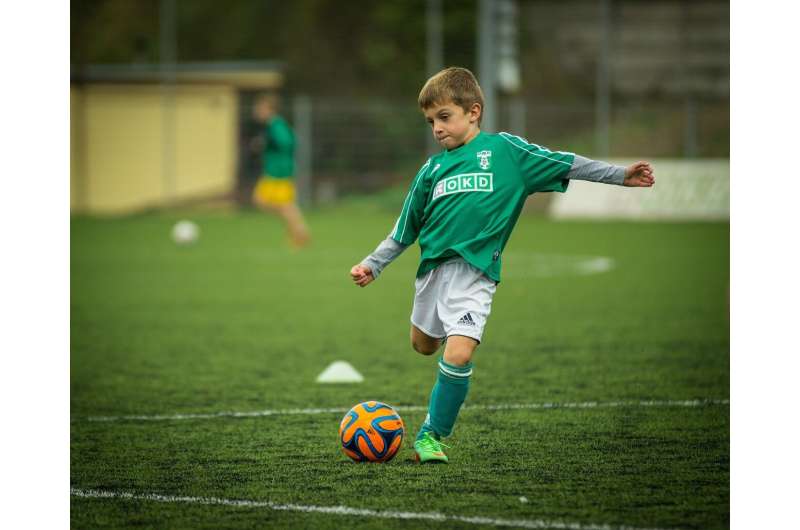This article has been reviewed according to Science X's editorial process and policies. Editors have highlighted the following attributes while ensuring the content's credibility:
fact-checked
trusted source
written by researcher(s)
proofread
Active or overscheduled kids? How parents can consider benefits and risks of extracurricular activities

From hockey and dance to chess club, families can be pulled in many extracurricular directions.
It's easy for parents to be overwhelmed by the choices of activities for their child—or also, how accessible these are, for reasons like financial barriers or transportation challenges.
In the midst of this, parents receive advice to ensure their kids move their bodies and challenge their brains, be creative, but also to carve out space for family and downtime.
A survey conducted by Ipsos for Global News found that on average, parents paid $1,160 for their children's extracurricular activities in the 2017-18 school year.
Fortunately, there are resources or neighborhood hubs that help identify available activities for kids—for instance, this resource allows you to search by Canadian location, activity type and price (including some free activities).
To help families navigate extracurricular activities, we offer parents suggestions to help make informed decisions about finding a balance that aims to align with their family values and meet the individual needs of their children.
Benefits of kids having a busy schedule
The good side of extracurriculars is that research shows kids involved in activities are more likely to have better friendships and fewer mental health problems.
Participating in multiple activities can also provide structure and a routine for children, which helps them feel in control of their environment and predict what is coming next.
Having a lot of scheduled activities can also help your child learn valued time-management skills, like how to complete their homework because they have soccer practice later that evening.
Friendships, belonging
Extracurricular activities are also a great opportunity for children to develop and nurture their own interests while forming meaningful friendships. Participating in extracurricular activities can help kids find a sense of belonging. Some activities may be specifically relevant to your child's culture, community or your own family concerns.
Extracurricular opportunities also allow children to explore new skills and to discover new strengths. Potentially, they learn routes to feeling accomplished that don't depend on academic performance. When they participate and succeed at an activity they enjoy, this can help boost their self-confidence.
Finally, participating in extracurricular activities can keep kids away from screens. A lot of research has shown the dangers of too much screen time.
Importance of free play, downtime
The bad side of overscheduling kids is that it can have adverse effects for some children and families. When kids are overscheduled, they often don't have time for other critically important parts of life.
Overscheduling kids may get in the way of unstructured playtime, which research has shown is extremely valuable for children's development. Unstructured free play has been shown to bolster children's creativity, increase their problem solving skills and allow children to demonstrate their own individuality
Additionally it is important for children to have downtime as it gives children a chance to pause, reflect and relax.
Overscheduling kids may also quickly overwhelm children as they are balancing multiple activities on top of their schoolwork—and may leave kids prone to stress, physical complaints and self-reported anxiety and depression.
Importance of family time
When kids are overbooked there may be less quality family time. Something as simple as eating a family meal together may become increasingly difficult for families with scheduling conflicts. Connecting as a family is important. Research has shown that when a family eats meals together, the children do better academically, and are less likely to suffer from mental health problems.
How can parents and caregivers find a balance between structured and unstructured time?
Tips for parents and caregivers
Listen to your child: Encourage their interests and preferences. Monitor your child's level of engagement. For example, are they excited to share what they learned or motivated to practice on their own? Are they withdrawn, moody or resistant to communicating about their activities? Consider whether your child enjoys the activity they are doing or how it suits their abilities.
Take some time to discuss which activities are most important and why. Variables might include: Which activities align with your family's values? Which activities align most with your child's interests or help nurture belonging or competence? Which activities suit your schedule? Use these discussions to establish priorities.
Quality over quantity: Focus on the quality of experiences. Think about whether your child is getting something out of the experience like learning a valuable skill, building important relationships or habits or even simply enjoying themselves. Think about whether the activity is valuable enough that it's worth the time it might take away from other important things like family time.
Family time: Dedicate time for family interactions. You can do something as simple as prioritizing eating meals together—it doesn't have to be only dinner, maybe family breakfast or family lunch depending on that day's schedule.
Stay flexible: Adjust schedules as interests evolve. It's OK for kids to change their interests! If they find the activity they used to love is just not that interesting to them anymore it's OK to shake things up. Overcommitting your child to an activity that they are no longer interested in increases the likelihood of burnout.
Stress & time management: Teach important life skills. Help your kids understand how to manage their schedules. This could include having a planner or agenda so they can lay out all their activities on top of any school commitments. Teach them how to balance their commitments so they have enough time to dedicate to schoolwork and extracurricular activities.
You can create a family schedule that's visible to everyone to help keep track of family plans.
This article is republished from The Conversation under a Creative Commons license. Read the original article.![]()





















